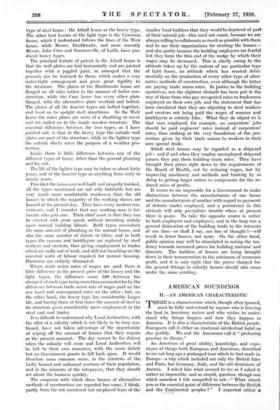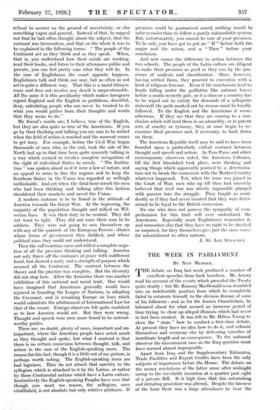AMERICAN SOUNDINGS
IL—AN AMERICAN CHARACTERISTIC THERE is a characteristic which, though often ignored, must be fully understood by anyone who is heaving the lead in American waters and who wishes to under- stand why things happen and how they happen in America. It is also a characteristic of the British people._ Foreigners call it either an irrational intellectual habit or else perfidy. We and the Americans call it " preferring practice to theory."
An American of great ability, knowledge, and expe-, rience of things both European and American, described to me not long ago a prolonged tour which he had made in Europe—a trip which included not only the British Isles and Paris, but Germany, Italy, and the old dominions of Austria. I asked him what seemed to me as I asked it rather an impossible, and so stupid, question, though one which somehow I felt compelled to ask—" What struck you as the essential point of difference between the Britiih and the Continental peoples " I expected either a
:10! tilt
refusal to answer on the ground of uncertainty, or else something vague and general. Instead of that, he rapped out that he had often thought aboUt the subject, that the contrast was tremendous, and that on the whole it was to be explained in the following terms. " The people of the Continent .act as they think and as they speak. When, that is, you understand how their minds are working, read their books, and listen to their utterances public and, private, you can feel pretty sure what they will do. In the case of Englishmen the exact opposite happens. Englishmen talk and think one way, but as often as not act in quite a different way. That this is a racial idiosyn- eras. y and doe's not involve any deceit is unquestionable. All the same it is this peculiarity which makes foreigners regard England and the English as perfidious, deceitful, deep, calculating people who can never be trusted to do what you would gather from their thoughts and words that they mean to do."
My friend's words are, I believe, true of the English, but they are also quite as true of the Americans. If you go by their thinking and talking you are sure to be misled when the field of action is reached and the moment comes to get busy. For example, before the Civil War began thousands of men who, in the end, took the side of the North had up to that time been quite sincerely talking in a way which seemed to involve complete recognition of the right of individual States to secede. " The Institu- tion " was spoken about as if it were a law of nature, and an appeal to arms to free the negroes and to keep the Southern States in the Union was regarded as wellnigh unthinkable. And yet when the fatal hour struck the men who had been thinking and talking after this fashion shouldered their muskets and saved the Union.
A modern instance is to be found in the attitude of America towards the Great War. At the beginning, the majority of the population thought and talked on Wil- sonian lines. It was their duty to be neutral. They did not want to fight. They did not raise their sons to be soldiers. They were not going to mix themselves up with any of the quarrels of the European Powers—States whose forms of government they disliked, and whose political aims they could not understand.
Then the call to action came and with it a complete nega- tion of all the previous thinking and talking. America not only threw off the costumes of peace with indifferent hand, but showed a unity and a strength of purpose which amazed all the Continent. The contrast between the theory and the practice was complete. But the diversity did not stop here. After the Armistice there was another exhibition of this national and racial trait. One would have imagined that Americans generally would have rejoiced in founding the League of Nations, in adopting the Covenant, and in remaking Europe on lines which would substitute the arbitrament of International Law for that of the sword. Foreign observers felt quite confident as to how America would act. But they were wrong. Thought and speech were once more found to be untrust- worthy guides.
There'are, no doubt, plenty of cases, important and un- important, where the American people have acted much as they thought and spoke, but what I contend is that there is no certain connexion between thought, talk, and action in the case of the English-speaking races. The reason for this fact, though it is a little out of my picture, is perhaps worth noting. The English-speaking races are bad logicians. They do not attach that sanctity to the syllogism which is attached to it by the Latins, or rather by those Continental nations which have a Latin culture. Instinctively the English-speaking Peoples have seen that though you must use reason, the syllogism, once eitablished, is not absolute but only relative Euidance. If premises could be guaranteed sound, nothing would be safer or easier than to follow a purely rationalistic system. But, unfortunately, you cannot be sure of your premises. To be safe, you have got to put an " If " before both the major and the minor, and a " Then " before your conclusion.
And now comes the difference in action between the two schools. The people of the Latin culture are diligent to make their premises as good as they can by the pro- cesses of analysis and classification. Once, however, having settled them, they proceed to execution with a kind of religious fervour. Even if the conclusions lead to heads falling under the guillotine like autumn leaves. before a south-westerly gale, or if a class or a country has to be wiped out to satisfy the demands of a syllogistic statecraft the path marked out by reason must be loyally followed. To the English and the Americans it seems otherwise. If they see that they are coming to a con- clusion which will land them in an absurdity, or in patent acts of cruelty or tyranny, they at once begin to re- examine their premises and, if necessary, to back down on them.
The American Republic itself may be said to have been founded upon a particularly violent contrast between thought and speech and action. As Tom Paine and other contemporary observers noted, the American Colonies, till the first bloodshed took place, were thinking and saying things which apparently pointed to a determina- tion not to break the connexion with the Mother Country whatever happened. Yet, when the issue was joined in the Court of War, men who up till then had sincerely believed that civil war was utterly impossible plunged with passion 'into the struggle. They fought as confi- dently as if they had never insisted that they were deter- mined to be loyal to the British connexion.
No one who does not possess the sympathy of com- prehension for this trait will ever understand the Americans. Especially must Englishmen remember it, and remember also that they have no right to be shocked or surprised, for they themselves give just the same cans:, for astonishment to other nations.
J. ST. LOE STRACHEY.























































 Previous page
Previous page